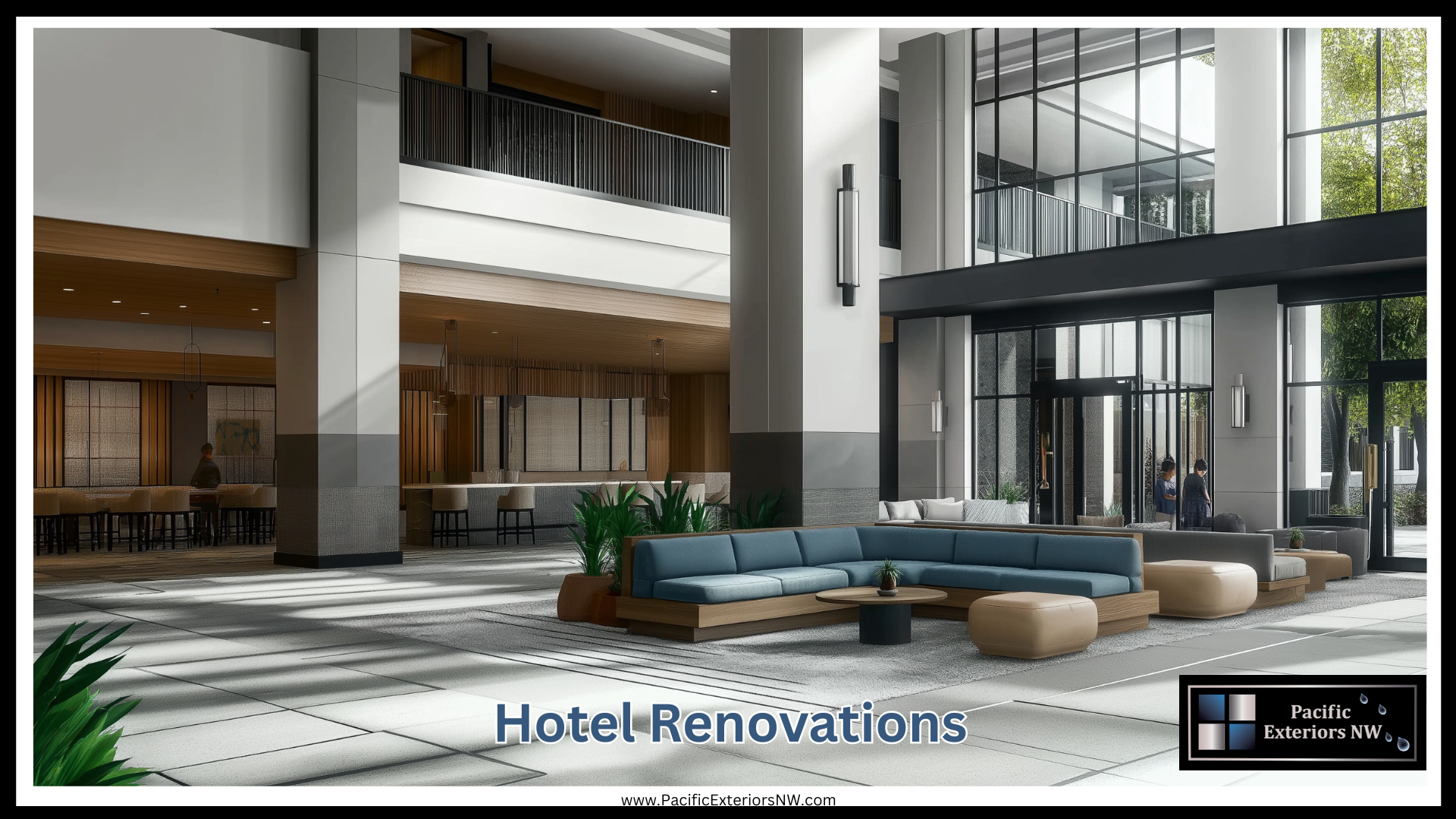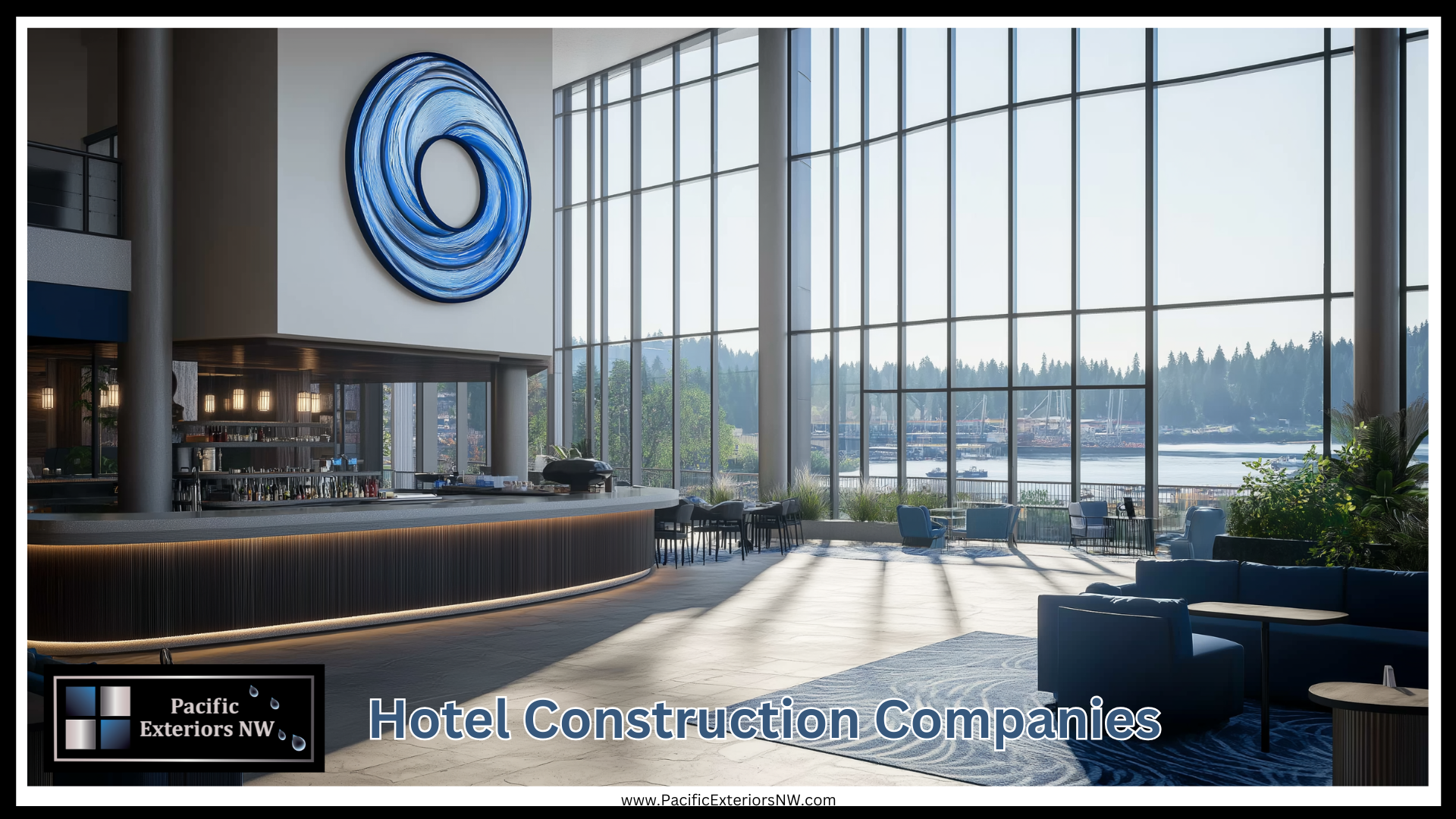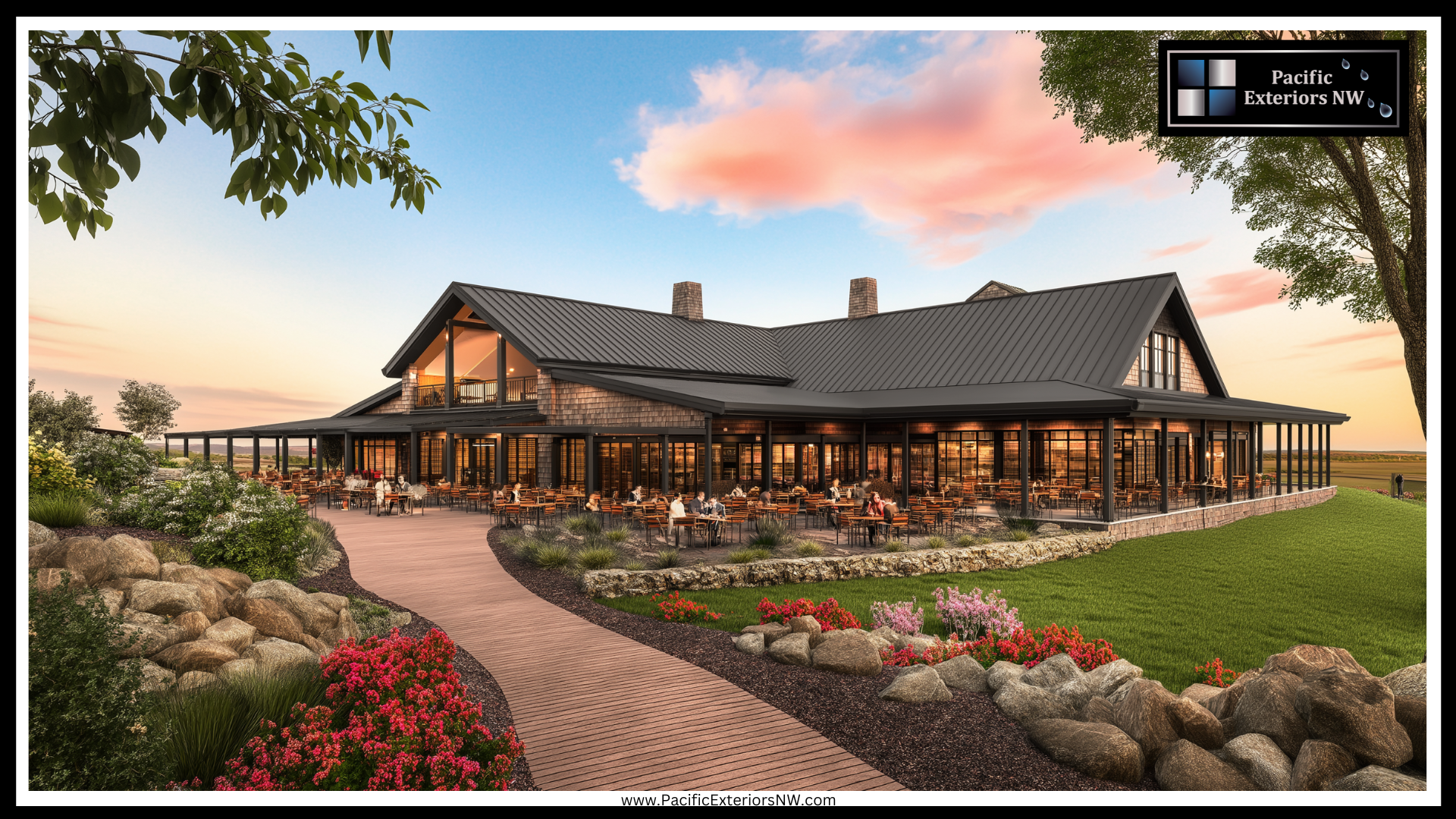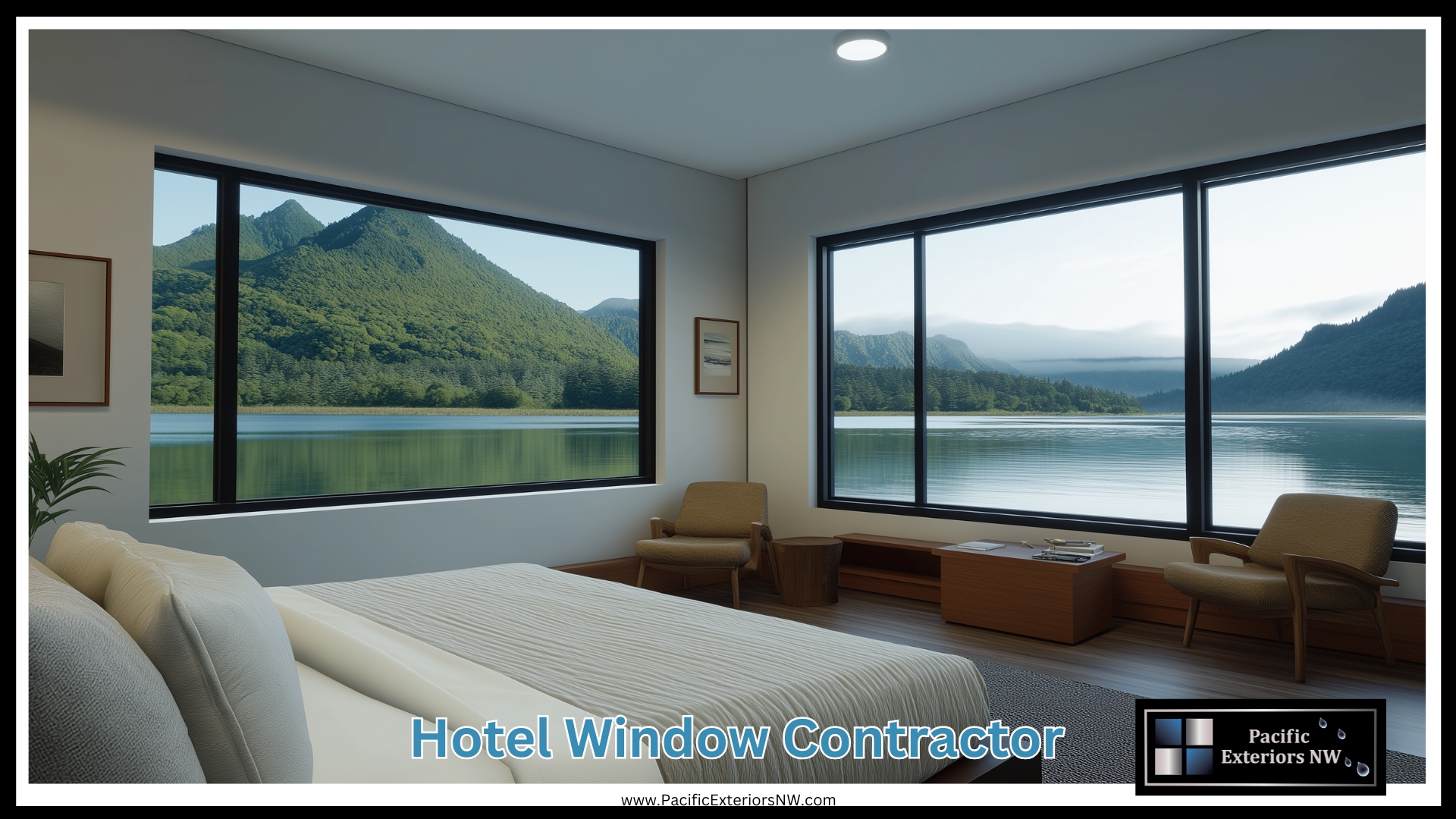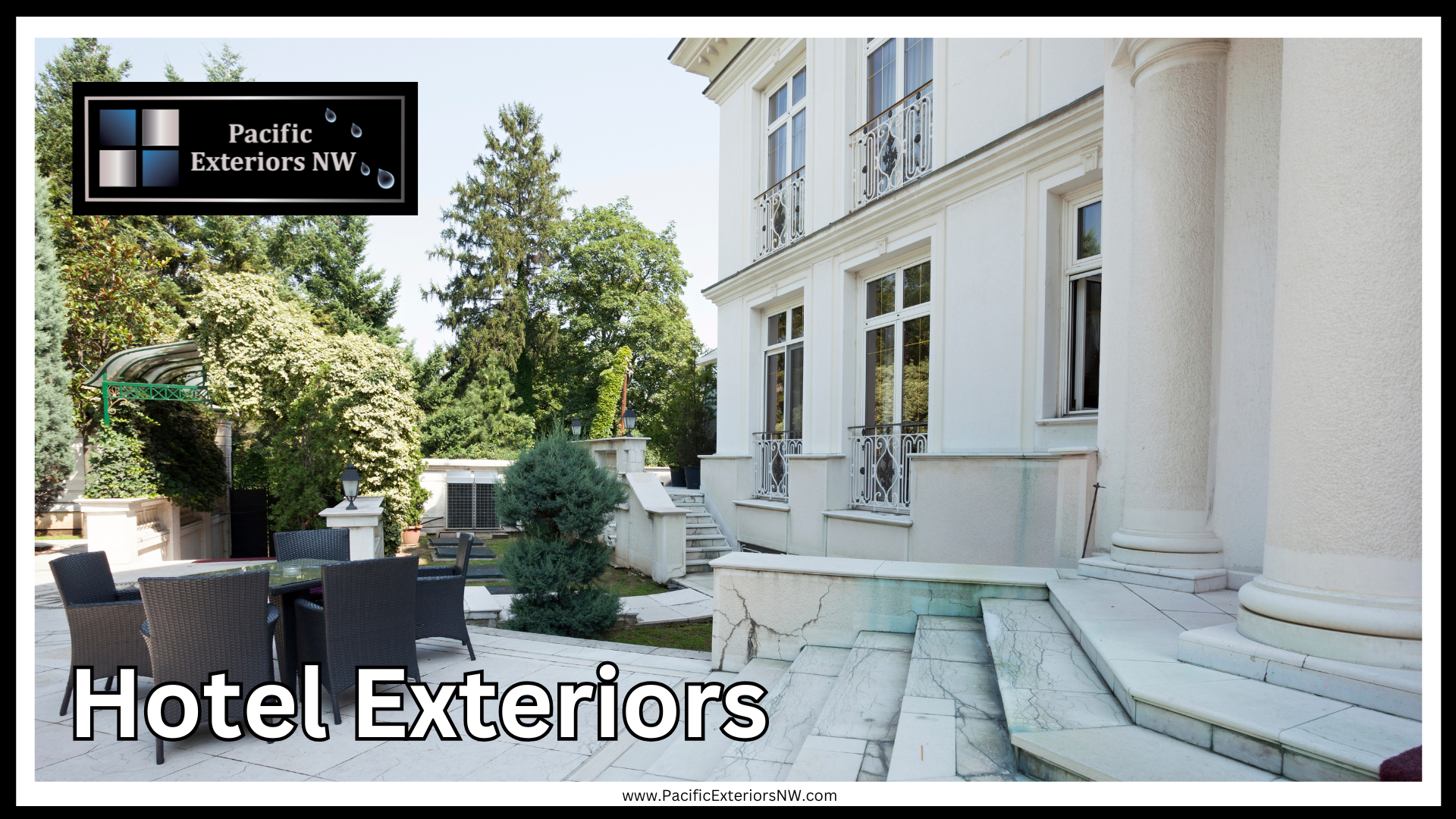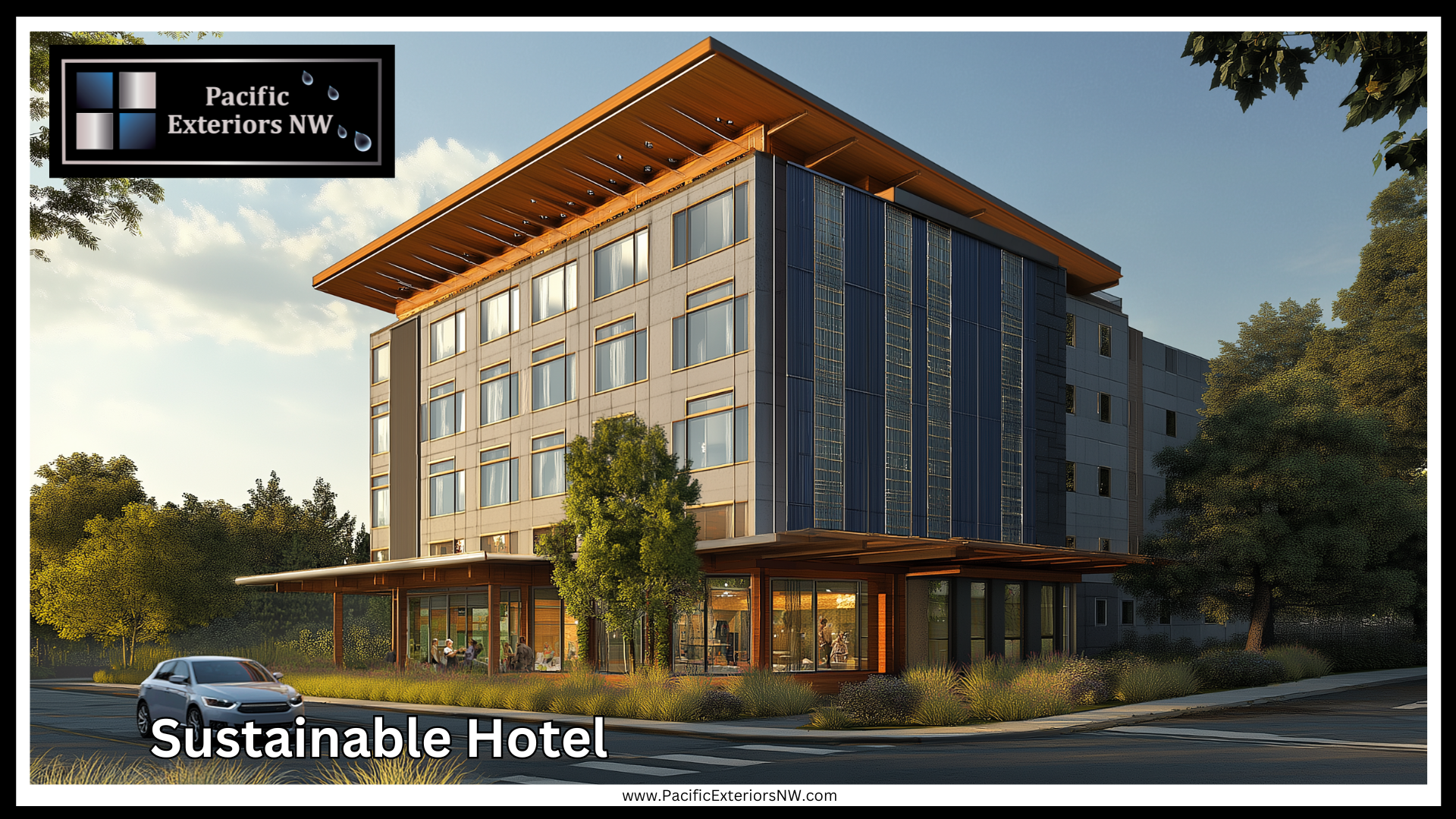
Sustainable building practices are no longer just a trend but a necessity. Hotels, often massive energy consumers, are at the forefront of this shift towards sustainability. As guests increasingly demand eco-friendly accommodations, modern hotels must adapt by incorporating green practices in everything from their roofing to their windows.
In this article, we’ll explore seven innovative sustainable building practices that modern hotels can adopt to reduce their environmental impact. We’ll delve into how Pacific Exteriors NW can help implement these eco-friendly solutions, from installing energy-efficient windows to designing eco-friendly roofs.
Why Sustainability Matters in Modern Hotel Design
The shift towards sustainability in the hotel industry isn’t just about keeping up with the times—it’s about staying ahead of the curve. Today’s travelers are more informed than ever, often choosing accommodations based on their environmental impact. Sustainable hotels reduce their carbon footprint and enjoy energy efficiency and water conservation cost savings.
Did you know…
According to a recent study, hotels that implement sustainable practices see an average increase of 9% in bookings. Sustainability isn’t just good for the planet; it’s great for business, too!
Eco-Friendly Roofing: The First Step Towards Sustainability
Roofing is one of the most critical elements in a hotel’s overall sustainability. It serves as the first line of defense against the elements and plays a significant role in a building’s energy efficiency. Selecting the right roofing material and design can produce substantial environmental benefits, reduce energy costs, and enhance the overall guest experience. Pacific Exteriors NW offers a variety of eco-friendly roofing solutions that align with the goals of sustainability and long-term performance.
Cool Roofs: Reducing Heat Island Effect
Cool roofs are specifically designed to reflect more sunlight and absorb less heat than traditional roofing materials. By using reflective surfaces or special coatings, these roofs help reduce the amount of heat entering a building, lowering the need for air conditioning and reducing energy consumption.
Cool roofs also play a vital role in mitigating the urban heat island effect, a phenomenon where urban areas become significantly warmer than their rural surroundings due to human activities. This reduction in ambient temperature can be a significant environmental benefit for hotels in densely populated areas.
Key Benefits of Cool Roofs:
- Energy Efficiency: Cool roofs lower the need for air conditioning by reflecting sunlight and reducing heat absorption, resulting in up to 15% energy savings during peak cooling seasons.
- Extended Roof Lifespan: Cool roofs can reduce thermal shock (the stress caused by rapid temperature changes), leading to longer roof life.
- Environmental Impact: Reducing the energy required for cooling lowers greenhouse gas emissions and the hotel’s overall carbon footprint.
Sustainable Roofing Materials: The Future of Eco-Friendly Design
When selecting roofing materials for a sustainable hotel, it’s essential to consider both the environmental impact of the materials and their performance in terms of energy efficiency and durability. Pacific Exteriors NW offers several sustainable roofing materials that meet these criteria.
Recycled Metal Roofing: Durable and Recyclable
Metal roofing, especially when made from recycled materials, is one of the most durable and eco-friendly roofing options available. Recycled metal roofs are composed of aluminum, copper, and steel, all of which can be recycled at the end of their life, making them a cradle-to-cradle solution.
Advantages of Recycled Metal Roofing:
- Longevity: Metal roofs can last 50 years or more, significantly reducing the need for replacement and the associated environmental impact.
- Energy Efficiency: Metal roofs can be coated with reflective surfaces to enhance their ability to deflect solar heat, making them an excellent choice for cool roofing.
- Fire Resistance: Metal roofing is naturally fire-resistant, adding an extra layer of safety for hotel structures.
Sustainable Asphalt Shingles: Modern and Cost-Effective
Asphalt shingles are a popular choice for many hotels due to their cost-effectiveness and ease of installation. However, not all asphalt shingles are created equal when it comes to sustainability. Pacific Exteriors NW offers sustainable asphalt shingles made from recycled materials, reducing the demand for virgin resources and lowering the environmental impact of production.
Why Choose Sustainable Asphalt Shingles?
- Recyclability: Sustainable asphalt shingles can be recycled at the end of their life, reducing waste and contributing to a circular economy.
- Energy Savings: These shingles can improve a building’s energy efficiency by reducing heat absorption when combined with reflective coatings.
- Cost Efficiency: Sustainable asphalt shingles balance upfront cost and long-term environmental benefits, making them attractive for hotels seeking sustainability without compromising their budget.
Clay and Slate Roofing: Timeless Elegance with an Eco-Friendly Twist
Clay and slate roofing tiles are natural, durable, and environmentally friendly options for hotel roofing. These materials have been used for centuries for their longevity and aesthetic appeal. Today, they are making a comeback in sustainable building practices due to their minimal environmental impact and impressive durability.
Benefits of Clay and Slate Roofing:
- Natural Materials: Both clay and slate are naturally occurring materials that require minimal processing, reducing their carbon footprint.
- Durability: Clay and slate roofs can last over a century with proper maintenance, offering an extremely low lifecycle environmental impact.
- Thermal Performance: These materials provide excellent insulation, helping to maintain consistent indoor temperatures and reduce the need for artificial heating and cooling.
Photovoltaic Roofing: Integrating Solar Power into Design
Photovoltaic (PV) roofing is an innovative solution that integrates solar power directly into the roofing material, allowing hotels to generate their own electricity. This technology is an excellent choice for hotels investing in renewable energy while maximizing roof space.
How Photovoltaic Roofing Works:
- Integrated Solar Panels: PV roofing incorporates solar cells into traditional roofing materials, such as shingles or tiles, enabling the roof to generate electricity from sunlight.
- Energy Independence: By producing their own renewable energy, hotels can reduce reliance on the grid, lower electricity costs, and significantly cut their carbon footprint.
- Aesthetic Appeal: PV roofing offers a sleek, modern appearance that can enhance the hotel’s overall aesthetic, appealing to guests who value sustainability and innovation.
Advantages of Photovoltaic Roofing:
- Reduced Energy Costs: Hotels can save significantly on electricity bills by generating their own power, particularly in sunny regions.
- Environmental Impact: Using solar power reduces greenhouse gas emissions and supports global efforts to combat climate change.
- Innovative Branding: Photovoltaic roofs can serve as a visible commitment to sustainability, enhancing the hotel’s brand image among eco-conscious travelers.
Choosing the Right Eco-Friendly Roofing with Pacific Exteriors NW
Investing in eco-friendly roofing is one of the most impactful steps a hotel can take towards sustainability. Whether opting for cool roofs to reduce energy consumption, recycled metal for durability, sustainable asphalt shingles for cost-effectiveness, or photovoltaic roofing for renewable energy production, each choice contributes to a greener, more sustainable future. Pacific Exteriors NW is committed to providing the best eco-friendly roofing solutions, ensuring that modern hotels can meet their sustainability goals without compromising quality or performance.
Energy-Efficient Windows: Bright Ideas for Hotel Design
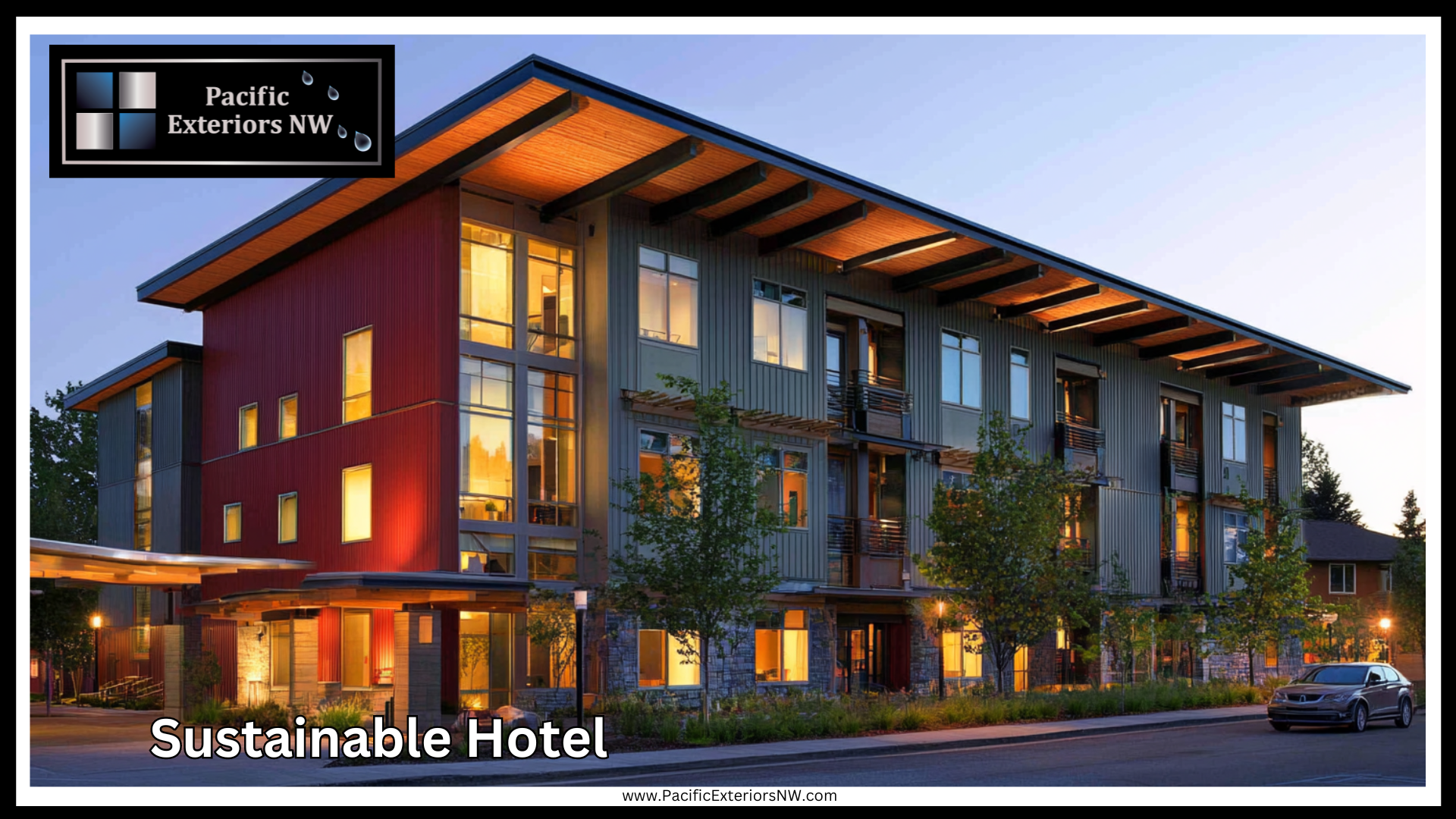
Windows are more than just a source of natural light and views—they are critical to a building’s energy efficiency. For hotels, where energy consumption is a significant operational cost, selecting the right windows can lead to substantial savings and a reduced environmental impact. Pacific Exteriors NW offers a range of energy-efficient window solutions that help hotels achieve their sustainability goals without compromising aesthetics or guest comfort.
Double-Glazed Windows: A Barrier Against Heat Loss and Noise
Double-glazed windows are a staple in energy-efficient building design. These windows consist of two layers of glass separated by a spacer and a sealed air gap, typically filled with an inert gas like argon. This configuration dramatically improves insulation compared to single-pane windows, making them an ideal choice for hotels looking to reduce heating and cooling costs.
Key Benefits of Double-Glazed Windows:
- Thermal Insulation: The air gap between the glass layers acts as an insulating barrier, reducing heat loss in winter and heat gain in summer. This leads to a more stable indoor temperature and lower energy bills.
- Noise Reduction: Double-glazed windows significantly reduce outside noise, creating a quieter and more restful environment for hotel guests. This is particularly important for hotels in busy urban areas or near airports.
- Condensation Control: By maintaining a more consistent internal temperature, double-glazed windows help reduce the likelihood of condensation forming inside the windows, which can lead to mold and mildew issues.
Triple-Glazed Windows: Taking Energy Efficiency to the Next Level
For hotels in extreme climates, like here in the Pacific Northwest, whether hot or cold, triple-glazed windows offer an even higher level of insulation. With three layers of glass and two air gaps, these windows provide superior energy efficiency, making them ideal for environments where maintaining a comfortable indoor temperature is challenging.
Advantages of Triple-Glazed Windows:
- Enhanced Thermal Performance: Triple-glazed windows provide up to 50% more insulation than double-glazed options, leading to significant energy savings, especially in climates with harsh winters or summers.
- Improved Soundproofing: The additional glass layer further reduces noise, enhancing guest comfort and privacy.
- Increased Security: The extra pane of glass makes triple-glazed windows more resistant to breakage, offering added security for hotel properties.
Low-E Coatings: The Invisible Shield for Enhanced Efficiency
Low-emissivity (Low-E) coatings are a critical innovation in energy-efficient window design. These coatings consist of a thin, transparent metal or metallic oxide layer applied to the glass surface. The coating reflects infrared heat while allowing visible light to pass through, which helps regulate the building’s temperature without sacrificing natural light.
How Low-E Coatings Work:
- Winter Benefits: In colder months, Low-E coatings reflect heat generated inside the building back into the room, reducing the need for additional heating.
- Summer Benefits: During hot weather, the coating reflects outside heat away from the building, keeping interiors cooler and reducing the reliance on air conditioning.
- UV Protection: Low-E coatings also block a significant amount of ultraviolet (UV) rays, which can cause furniture, carpets, and artwork to fade over time, thereby preserving the interior aesthetics of the hotel.
Smart Glass: Dynamic Control of Light and Heat
Smart glass, also known as electrochromic or switchable glass, represents the cutting edge of window technology. This innovative material can change its tint in response to electrical currents, allowing hotel operators to control the amount of light and heat entering a room. Smart glass offers unparalleled energy efficiency, guest comfort, and aesthetic flexibility.
Applications and Benefits of Smart Glass:
- Dynamic Tinting: Smart glass can automatically adjust its level of tint based on the intensity of sunlight, optimizing indoor lighting and temperature without the need for blinds or curtains.
- Energy Savings: By controlling the solar gain, smart glass reduces the need for artificial lighting and air conditioning, leading to substantial energy savings.
- Guest Experience: Guests can adjust the tint of the windows in their rooms using a remote control or a wall switch, allowing them to personalize their comfort level.
- Privacy on Demand: Besides controlling light and heat, smart glass can also switch to an opaque state, offering privacy without needing traditional window coverings.
Window Frame Materials: Balancing Sustainability and Performance
While glass is crucial for energy efficiency, the material used for window frames also plays a significant role. Pacific Exteriors NW provides a range of sustainable and high-performance frame materials that complement energy-efficient glazing.
Vinyl Frames: Affordable and Low Maintenance
Vinyl window frames are popular for their affordability, durability, and low maintenance requirements. They offer good insulation properties, making them a cost-effective option for hotels looking to improve energy efficiency.
Benefits of Vinyl Frames:
- Thermal Performance: Vinyl is a poor conductor of heat, which helps reduce heat transfer and improve the window’s overall insulation.
- Weather Resistance: Vinyl frames resist moisture and do not require painting or sealing, reducing maintenance costs over time.
- Cost-Effective: Vinyl is generally more affordable than other materials, making it an excellent choice for budget-conscious hotel projects.
Wood Frames: Natural Insulation with Timeless Appeal
Wooden window frames offer excellent insulation and a natural, aesthetically pleasing appearance. While they require more maintenance than vinyl or metal frames, their insulation properties and beauty make them a preferred choice for luxury hotels.
Advantages of Wood Frames:
- Superior Insulation: Wood is a natural insulator, providing excellent thermal performance and helping to maintain a consistent indoor temperature.
- Aesthetic Flexibility: Wood frames can be painted or stained to match the hotel’s interior and exterior design, adding a touch of luxury and warmth.
- Sustainability: When sourced from responsibly managed forests, wood is a renewable resource that supports sustainable building practices.
Aluminum Frames: Strength and Modern Style
Aluminum window frames are known for their strength, durability, and sleek appearance. While aluminum is a good conductor of heat, modern frames often include thermal breaks—insulating sections that reduce heat transfer—to improve energy efficiency.
Why Choose Aluminum Frames?
- Durability: Aluminum frames are highly resistant to the elements, making them ideal for coastal hotels or areas with harsh weather conditions.
- Slim Profiles: The strength of aluminum allows for thinner frame profiles, maximizing the glass area and allowing more natural light to enter the room.
- Modern Aesthetic: Aluminum’s sleek, contemporary look is perfect for modern hotel designs emphasizing clean lines and minimalism.
Integrated Window Technologies: Bringing It All Together
In addition to selecting the right glass and frame materials, integrating advanced window technologies can further enhance a hotel’s energy efficiency and guest experience.
Integrated Blinds and Shades
Windows with built-in blinds or shades offer a streamlined, low-maintenance solution for controlling light and privacy. These integrated systems are sealed within the window unit, protecting them from dust and damage while reducing the need for external window treatments.
Benefits of Integrated Systems:
- Convenience: Guests can easily adjust the blinds or shades with a remote control or wall switch, improving their overall experience.
- Energy Efficiency: Integrated blinds help to regulate indoor temperatures by blocking or allowing sunlight as needed, further reducing energy consumption.
- Cleanliness: Sealed blinds or shades are protected from dust and debris, reducing maintenance and improving hygiene.
Window Sensors and Automation
Modern hotel windows can be equipped with sensors and automation systems that enhance energy efficiency and security. For example, windows can be fitted with sensors that automatically close when they detect rain or strong winds or adjust window tint based on the time of day.
Advantages of Window Automation:
- Energy Management: Automated systems can optimize natural light and ventilation, reducing reliance on artificial lighting and HVAC systems.
- Security: Sensors can alert hotel staff if a window is left open or tampered with, enhancing security.
- Guest Convenience: Automated windows provide a more comfortable and seamless guest experience, particularly in high-tech or luxury accommodations.
Choosing Energy-Efficient Windows with Pacific Exteriors NW
Selecting the right energy-efficient windows is critical in creating a sustainable, comfortable, and visually appealing hotel environment. Whether through double- or triple-glazed windows, Low-E coatings, smart glass, or advanced frame materials, each choice reduces a hotel’s energy consumption and environmental impact. Pacific Exteriors NW is dedicated to providing state-of-the-art window solutions that meet the highest energy efficiency, durability, and design standards, ensuring that your hotel not only meets but exceeds guest expectations while embracing sustainability.
Conclusion: Embracing Sustainability with Pacific Exteriors NW
Sustainable building practices are not just about environmental responsibility—they’re about creating a better experience for guests and ensuring the longevity of the hotel industry. Each element plays a crucial role in reducing a hotel’s carbon footprint and operational costs, from eco-friendly roofing to energy-efficient windows. Pacific Exteriors NW is proud to be a leader in this movement, offering innovative, sustainable solutions for modern hotels prioritizing luxury and environmental stewardship.
FAQs
1. What are the cost benefits of sustainable building practices for hotels?
Sustainable practices often lead to lower operational costs through energy savings, reduced water usage, and less waste production. Over time, these savings can offset the initial investment in sustainable materials and systems.
2. How can hotels maintain luxury while being sustainable?
Luxury and sustainability are not mutually exclusive. Many sustainable practices, like green roofs and energy-efficient windows, enhance guest comfort and aesthetic appeal while reducing environmental impact.
3. Are there any government incentives for hotels to adopt sustainable practices?
Yes, many governments offer incentives, such as tax breaks and grants, for businesses that implement energy-efficient and sustainable building practices. Pacific Exteriors NW can help you navigate these opportunities.
4. How does Pacific Exteriors NW ensure the sustainability of its roofing materials?
Pacific Exteriors NW uses high-quality, sustainable materials such as recycled metal and eco-friendly shingles. These materials are durable, energy-efficient, and reduce the overall environmental impact of the building.
5. Can sustainable building practices increase hotel bookings?
Absolutely. Many guests prefer to stay in hotels that align with their values, including environmental responsibility. Sustainable hotels often see an increase in bookings from eco-conscious travelers.



